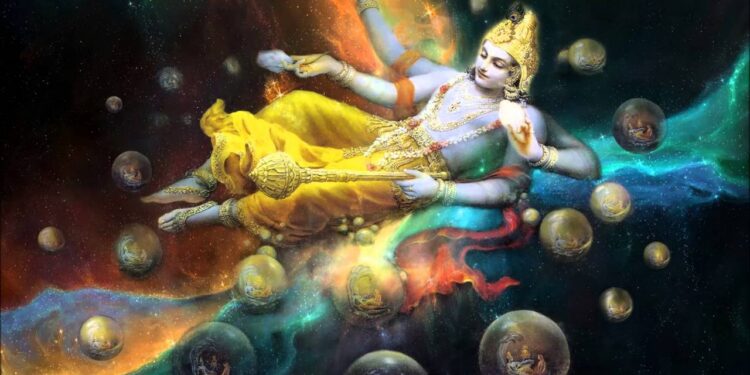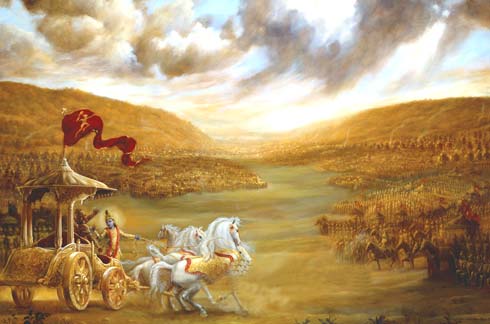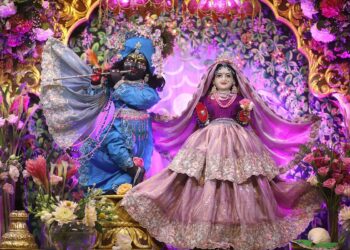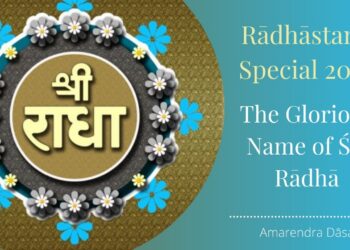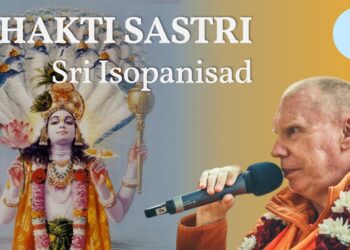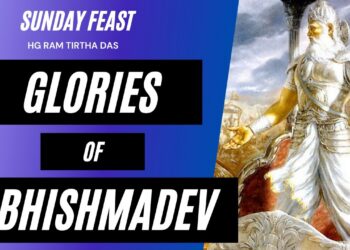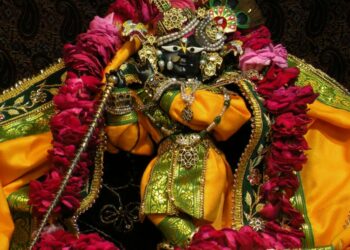Bilvamangal Das prabhu’s lecture on the month of Purushottoma at Amit Prabhu and Palka Mataji’s home.
Bhagavad-Gita, CH 15, TEXT 7
mamaivāṁśo jīva-loke
jīva-bhūtaḥ sanātanaḥ
manaḥ-ṣaṣṭhānīndriyāṇi
prakṛti-sthāni karṣati
SYNONYMS
mama—My; eva—certainly; aṁśaḥ—fragmental particle; jīva-loke—in the world of conditional life; jīva-bhūtaḥ—the conditioned living entity; sanātanaḥ—eternal; manaḥ—with the mind; ṣaṣṭhāni—the six; indriyāṇi—senses; prakṛti—in material nature; sthāni—situated; karṣati—is struggling hard.
TRANSLATION
The living entities in this conditioned world are My eternal fragmental parts. Due to conditioned life, they are struggling very hard with the six senses, which include the mind.
PURPORT
In this verse the identity of the living being is clearly given. The living entity is the fragmental part and parcel of the Supreme Lord—eternally. It is not that he assumes individuality in his conditional life and in his liberated state becomes one with the Supreme Lord. He is eternally fragmented. It is clearly said, sanātanaḥ. According to the Vedic version, the Supreme Lord manifests and expands Himself in innumerable expansions, of which the primary expansions are called viṣṇu-tattva and the secondary expansions are called the living entities. In other words, the viṣṇu-tattva is the personal expansion, and the living entities are the separated expansions. By His personal expansion, He is manifested in various forms like Lord Rāma, Nṛsiṁhadeva, Viṣṇumūrti and all the predominating Deities in the Vaikuṇṭha planets. The separated expansions, the living entities, are eternally servitors. The personal expansions of the Supreme Personality of Godhead, the individual identities of the Godhead, are always present. Similarly, the separated expansions of living entities have their identities. As fragmental parts and parcels of the Supreme Lord, the living entities also have fragmental portions of His qualities, of which independence is one. Every living entity, as an individual soul, has his personal individuality and a minute form of independence. By misuse of that independence one becomes a conditioned soul, and by proper use of independence he is always liberated. In either case, he is qualitatively eternal, as the Supreme Lord is. In his liberated state he is freed from this material condition, and he is under the engagement of transcendental service unto the Lord; in his conditioned life he is dominated by the material modes of nature, and he forgets the transcendental loving service of the Lord. As a result, he has to struggle very hard to maintain his existence in the material world.
The living entities, not only human beings and the cats and dogs, but even the greater controllers of the material world—Brahmā, Lord Śiva and even Viṣṇu—are all parts and parcels of the Supreme Lord. They are all eternal, not temporary manifestations. The word karṣati (“struggling” or “grappling hard”) is very significant. The conditioned soul is bound up, as though shackled by iron chains. He is bound up by the false ego, and the mind is the chief agent which is driving him in this material existence. When the mind is in the mode of goodness, his activities are good; when the mind is in the mode of passion, his activities are troublesome; and when the mind is in the mode of ignorance, he travels in the lower species of life. It is clear, however, in this verse, that the conditioned soul is covered by the material body, with the mind and the senses, and when he is liberated this material covering perishes, but his spiritual body manifests itself in its individual capacity. The following information is there in the Mādhyandināyana-śruti: sa vā eṣa brahma-niṣṭha idaṁ śarīraṁ martyam atisṛjya brahmābhisampadya brahmaṇā paśyati brahmaṇā śṛṇoti brahmaṇaivedaṁ sarvam anubhavati. It is stated here that when a living entity gives up this material embodiment and enters into the spiritual world, he revives his spiritual body, and in his spiritual body he can see the Supreme Personality of Godhead face to face. He can hear and speak to Him face to face, and he can understand the Supreme Personality as He is. From smṛti also it is understood, vasanti yatra puruṣāḥ sarve vaikuṇṭha-mūrtayaḥ: in the spiritual planets everyone lives in bodies featured like the Supreme Personality of Godhead’s. As far as bodily construction is concerned, there is no difference between the part-and-parcel living entities and the expansions of viṣṇu-mūrti. In other words, at liberation the living entity gets a spiritual body by the grace of the Supreme Personality of Godhead.
The words mamaivāṁśaḥ (“fragmental parts and parcels of the Supreme Lord”) are also very significant. The fragmental portion of the Supreme Lord is not like some material broken part. We have already understood in the Second Chapter that the spirit cannot be cut into pieces. This fragment is not materially conceived. It is not like matter, which can be cut into pieces and joined together again. That conception is not applicable here, because the Sanskrit word sanātana (“eternal”) is used. The fragmental portion is eternal. It is also stated in the beginning of the Second Chapter that in each and every individual body the fragmental portion of the Supreme Lord is present (dehino ‘smin yathā dehe). That fragmental portion, when liberated from the bodily entanglement, revives its original spiritual body in the spiritual sky in a spiritual planet and enjoys association with the Supreme Lord. It is, however, understood here that the living entity, being the fragmental part and parcel of the Supreme Lord, is qualitatively one with the Lord, just as the parts and parcels of gold are also gold.
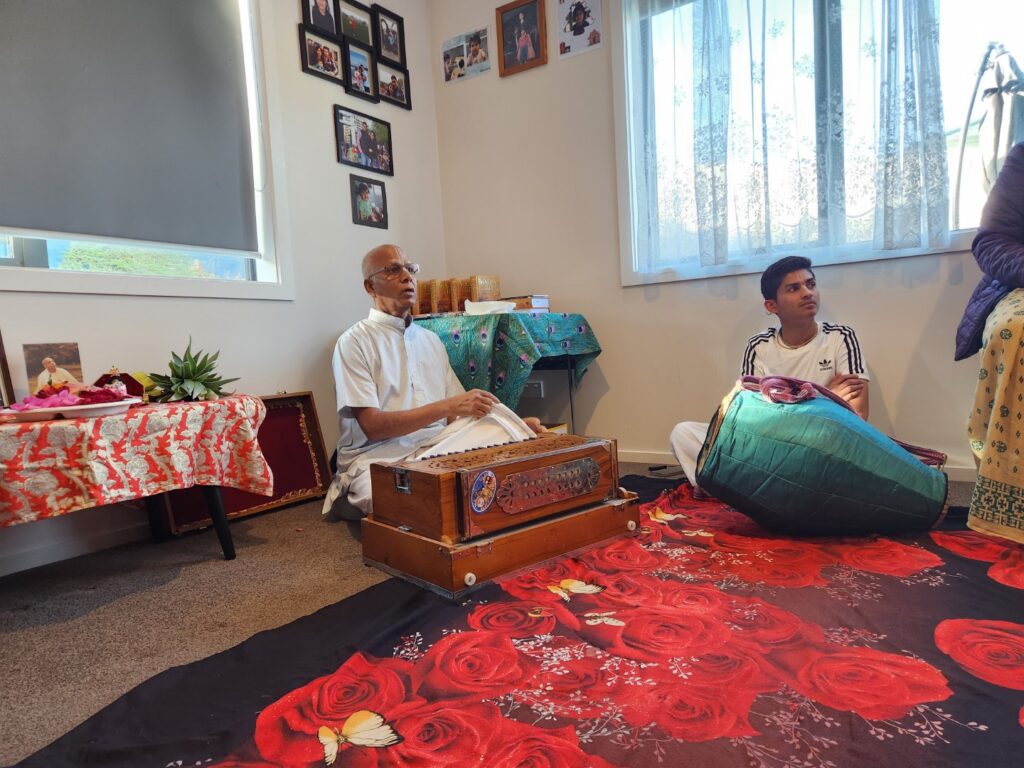
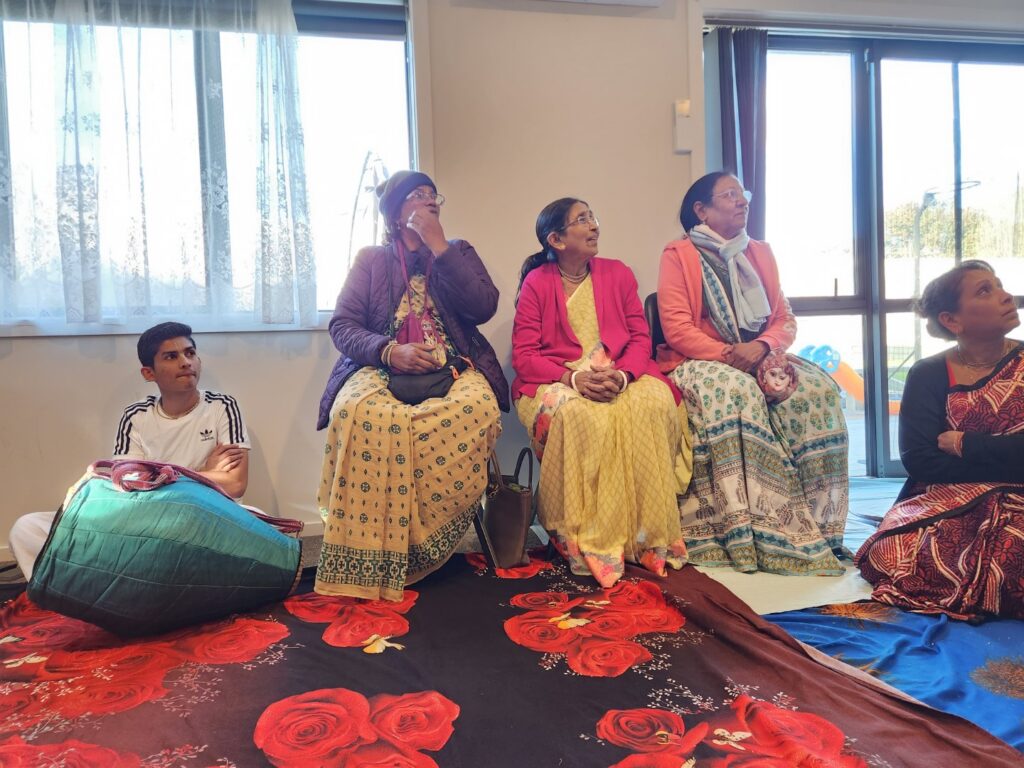


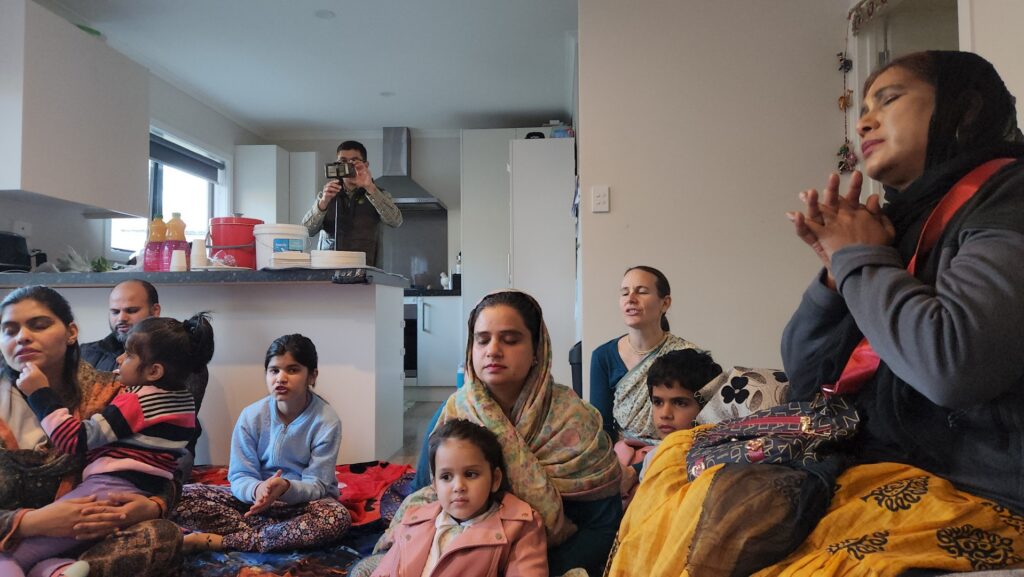
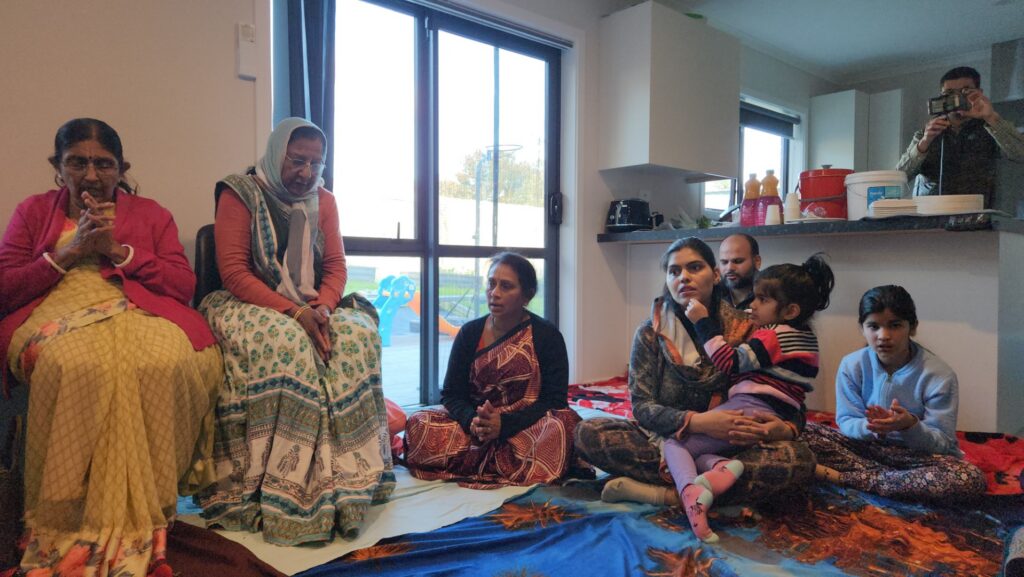
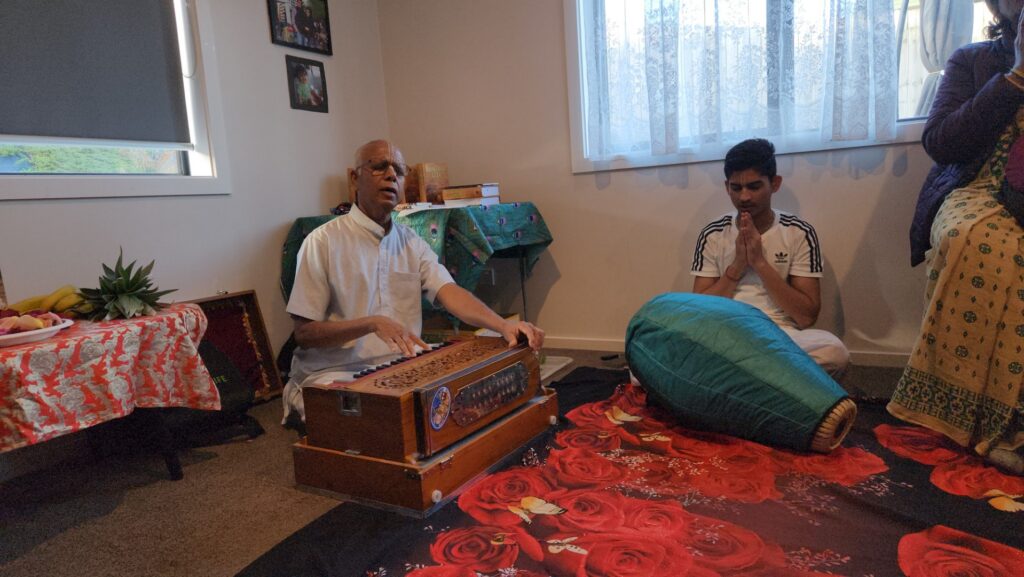
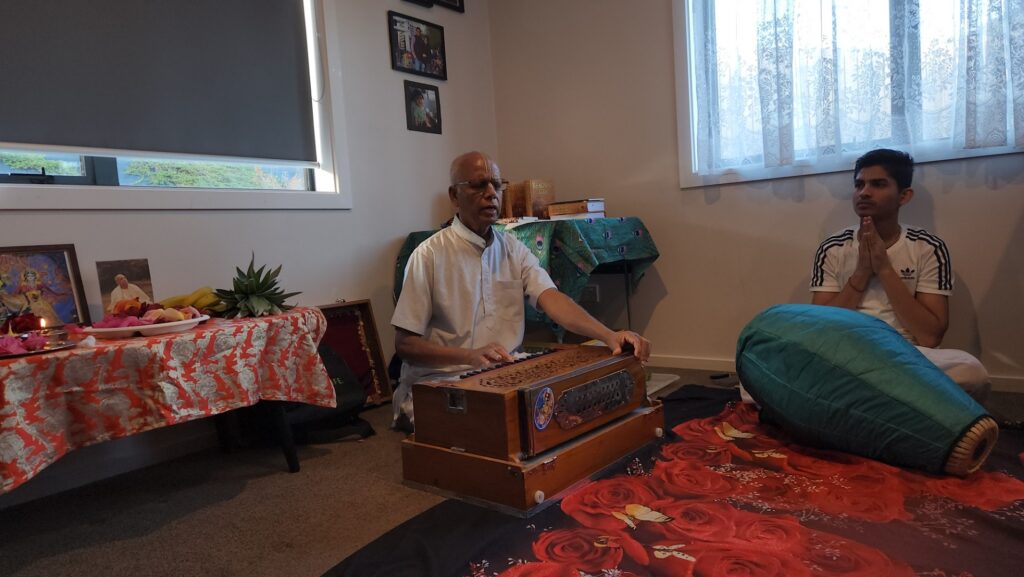
Bhagavad-Gita Chapter 9, Text 26
patraṁ puṣpaṁ phalaṁ toyaṁ
yo me bhaktyā prayacchati
tad ahaṁ bhakty-upahṛtam
aśnāmi prayatātmanaḥ
If one offers Me with love and devotion a leaf, a flower, fruit or water, I will accept it.
Purushottama, the holy month, occurs once every three years – a period believed to be the most favourable for spiritual upliftment . It is also called mala masa (dirty month) by the performers of karma-kanda because they cannot get any material fruitive results from their worship during this month. Our acaryas elucidate that it is called mala masa because devotional activities performed in this month destroy the dirt and contamination caused by sins.
It is called adhika (extra) masa because Sri Krishna has placed all His potencies, mercy, blessings in this month, and also because one gets more results from any pious act. Only devotional service (Krishna-bhakti) gives results in this purusottama month.
Krishna’s Favourite Month
Of all months, Purusottama is Krishna’s favorite month. In the Gita, Krishna says: “I am celebrated both in the world and in the Vedas as that Supreme person: Purushottama” (15.18). The Lord of the Universe, Jagannath, is also known as Purushottama. His abode, Puri, is known as Purushottama-Dhama.
Just as Krsna is the supreme among all incarnations, Purusottama is the supreme and holiest among all the months.
The Glories of Purusottama month based on authoritative bonafide Vedic scriptures (from Padma Purana and Skanda Purana)
- Lord Sri Krishna declares: “Purusottama month has all the power I have to bless its observer. One who follows Purusottama vrata will destroy all his past sinful reactions. Without performing Purusottama vrata, one cannot perform pure devotional service. The value of Purusottama month is far more valuable than all other types of austerities and religious activities mentioned in the Vedas. Anyone who observes Purusottama vrata will return to my abode, Goloka, at the end of his life”.
- Durvasa Muni pronounces: “Just by bathing in a holy river during Purusottama month, one becomes sinless. The glory of all other months is not equal to one-sixteenth of the glory of the Purusottama month. By bathing in a holy place, giving charity and chanting the Holy Name of Krishna during Purusottama month, all miseries are destroyed, one attains all kinds of perfection and fulfills all his desires”.
- Valmiki Muni remarks: “By observing Purusottama vrata, one attains more benefit than performing one hundred horse sacrifices. All holy places live within the body of a Purusottama month vrati. Anyone who faithfully performs Purusottama vrata will go to Goloka Vrndavana”.
- Narada Muni vocalizes: “Purusottama month is the best of all months, vratas and austerities. Just by faithfully hearing the glories of Purusottama month, one attains Krishna-bhakti and immediately nullifies his sinful reactions. One who performs Purusottama vrata properly will attain unlimited sukrti and go to the spiritual world”.
- Naimisaranya Sages unitedly speak: “Merciful Purusottama month acts like a desire tree to fulfill a devotee’s desire”.
The Significance/ Benefits of Purushottam Month
Purusottama month is worshiped all over the universe by devotees, sages, demigods and even Laksmi Devi Herself. If one sincerely worships The Lordships Radha and Krishna in Purusottama month, he attains everything, all pious credits and virtues. Purusottama month is the best month for all – for spiritual advancement because in this highly auspicious month Lord Krishna overlooks all the aparadhas. Devotional practice during the month is said to bring to offenders the chance to be forgiven. One who observes Purusottama vrata, burns up the reactions of all his bad karmas and attains the direct service of Srimati Radha and Krishna.


